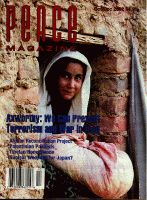
Peace Magazine Oct-Dec 2002, page 5. Some rights reserved.
Search for other articles by Fergus Watt here
Amid a growing US campaign against the new International Criminal Court (ICC), 80 governments recently convened a successful meeting to establish the new judicial body.
The meeting of the ICC Assembly of States Parties (ASP), September 3 to 10 at United Nations headquarters in New York, adopted a series of reports and working documents from the previous four years' work by the ICC Preparatory Commission. These include documents on rules of procedure and evidence, definitions of crimes, financing, the relationship between the Court and the UN, and a first-year budget.
The ICC is the world's first permanent international court addressing crimes against humanity, war crimes and genocide. Samoa recently became the 80th state to ratify the ICC Statute.
Canada has become one of the first countries to nominate a candidate for election as a judge on the ICC. When nominations opened at a major organizational meeting at the United Nations in New York, Foreign Affairs Minister Bill Graham announced that Canada is nominating Ambassador Philippe Kirsch for election as one of the Court's 18 judges. Elections take place in February 2003. The Court will be operational a few months later.
At the meeting, there were intense negotiations over the procedure for electing the Court's 18 judges. NGOs lobbied successfully for a decision on voting requirements that promote fair representation on the basis of gender, geography and the principal legal systems of the world. The agreed-upon formula also respects the Statute's requirements that candidates have expertise in criminal law, or international humanitarian or human rights law.
Canada's nominee for judge is a senior public servant who has been a leader in the work of establishing the ICC. Ambassador Kirsch chaired the 1998 UN conference in Rome where the ICC's treaty was negotiated, and for four years chaired the ICC Preparatory Commission meetings.
Graham also addressed the United States' vigorous campaign to undermine the Court. "As we all know, the United States has formally renounced its support for the ICC....[Its] concerns will best be assuaged by the Court moving beyond its noble intentions and proving its ability to bring to justice the most notorious violators of international humanitarian law.... We must demonstrate to every state that the Court we have created is impartial, apolitical and capable of interceding where national institutions have failed to deliver justice."
Canada will not signCanada has stated that it will not enter into an "Article 98 agreement," the bilateral deals being pushed by Washington to provide exemptions from ICC jurisdiction for American military staff and officials. Discussion of the US anti-ICC campaign dominated much of the corridor conversation at the ASP meeting. Canada led a large informal meeting of ASP delegates to share legal analysis of the complex US proposals.
Article 98 of the Rome Statute was intended to address delegations' concerns about potential conflicts between the Rome Statute and existing international obligations, such as SOFAs (Status of Forces Agreements, which set forth rules governing the stationing of military forces from a state on the territory of another state). The United States is using Article 98 as authority to negotiate separate bilateral agreements to opt out of the ICC's jurisdiction.
Most ASP delegates consider the Article 98 agreements -- dubbed "impunity agreements" by NGOs -- to be illegal, contrary to the purposes of the ICC treaty and a distortion of the intent of article 98.
Nevertheless, the United States has made a political investment in securing these agreements from as many countries as possible, putting pressure on the European Union and others to find compromise language. Only a few countries have signed agreements so far, but these have included Romania, a candidate for EUmembership.
Britain and Italy are reported to be trying to water down the EU common position which will set a benchmark for other governments elsewhere.
Fergus Watt is Executive Director, World Federalists, in Ottawa.

Peace Magazine Oct-Dec 2002, page 5. Some rights reserved.
Search for other articles by Fergus Watt here